Experiment planned and executed by Ari Sexner, juice business consultant.

You can download the full lab report here.
Introduction
In the first part of this series, Cold-Pressed VS Centrifugal – Part 1: Real Nutritional Data, we tested the nutrient content of juice made on both a centrifuge and a cold-press and found that the cold-pressed juice contained about 15% higher nutrient content.
For Part 2, we have created a green juice recipe on both types of machines, and tested nutrients every day for 3 days to compare how they deteriorate over time.
Recipe
For this test, we made a green juice blend consisting of:
- Cucumber
- Green Apple
- Kale
- Spinach
- Lemon
- Ginger
Nutrients
We had the lab test for Vitamin A, Vitamin C, and Iron. Iron did not show up in either of the samples, so we excluded it from the rest of this article.
Equipment
For the juice equipment, we used:
Cold-Press – Goodnature Countertop CT7 with Sammic CKE-8 for grinding
Centrifugal – Nutrifaster N450
Testing
We made the juice and bottled it, packed in cold packs to keep it at 45 degrees, and overnighted it to the lab. There were 3 samples of each type of juice, so that the lab could test one sample each day, without disturbing the other samples that are kept at 41 degrees.
Day 1
On day one, this sample shows almost identical amounts of Vitamin A, but much higher Vitamin C in the cold press sample.
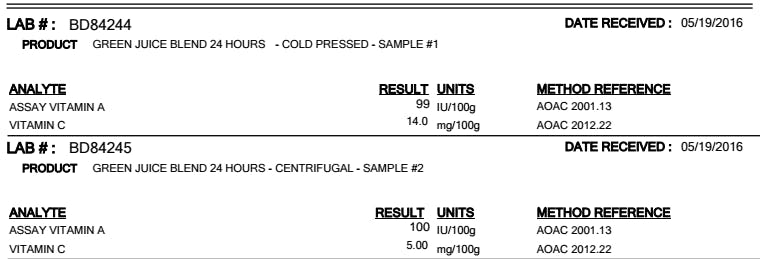
Day 2
At 48 hours we see, surprisingly, about a 3% rise in the Vitamin A in cold-pressed, and a 35% decrease in the centrifugal.
Vitamin C stayed in the same in the cold-pressed, and dropped 20% in the centrifugal.

Day 3
At 72 hours Vitamin A dropped off by about 12% in the cold-pressed juice, and 46% in the centrifugal sample.
Vitamin C remained the same in both samples.
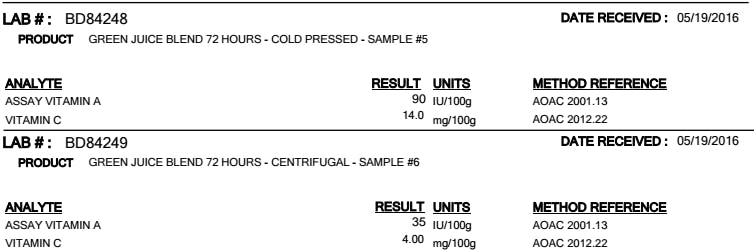
Results Table and Charts:
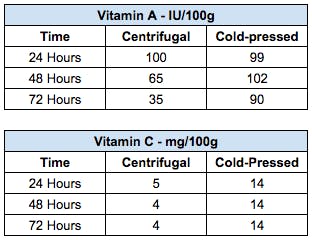
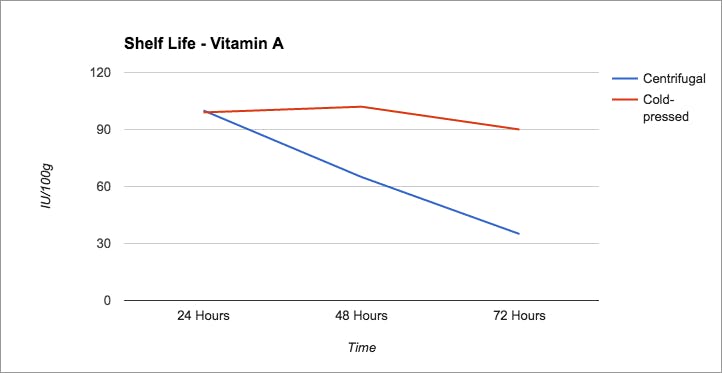
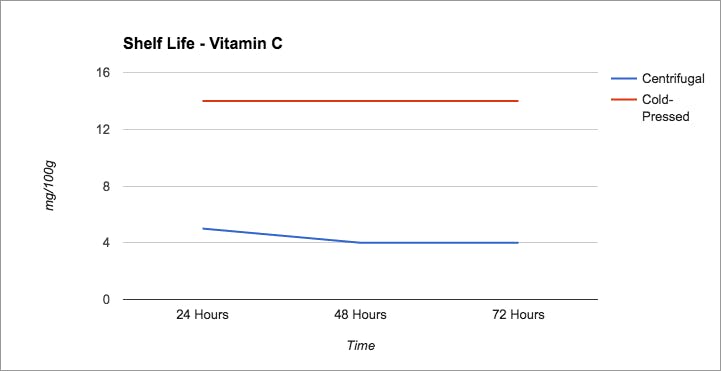
Conclusion
These lab tests show that this sample of cold-pressed juice did indeed hold up better over time compared to the centrifugal sample. We believe this is due to the following reasons:
- Centrifugal juice is highly oxidized due to the method of extraction.
- Centrifugal juice contains more solids / pulp and therefore breaks down faster than juice made on a press.

Download Data
Comments
I want the juicer that leaves a lot of pulp please.
If you want to maintain the pulp, use a blender and make a smoothie! The advantage of a juicer is that it removes the pulp so your body can absorb the nutrients easier and faster
Excited
Gerson has plenty of real life examples of this. Patients that follow the protocol to the T but, use the wrong juicer don't get better but, don't get worse. As soon as they switch to a masticating juicer their cancer or whatever "dis-ease" heals / detoxes, etc...
Gerson recommends a true juice press, not a masticating juicer. If I'm wrong please show me where Gerson recommends masticating juicers so I can educate myself. Thanks!
Everyone talking about cold pressed & centrifugal juice but no one truly explain about it. Here we got the exact explanation about cold pressed & centrifugal juice. Thanks for this kind of informative article. Keep it up!
Just a quick question. Why doesn't iron show up? There is spinach in the juices , so shouldn't there be some iron?
I am interested in the shelf life of the by-product pulp, both fruit & vegetable as a vegetable & fruit raw material for use in sauces, soup and bakery items. We are a non profit based in Santa Barbara county.
Thank you.
Terry
Terry, if you keep it cold it should be around the same as the juice.
Loving this data, but why does the data start from 24 hours later and not 0 hours?
would love to see some data on freezing then defrosted juice.
Phil, we have to send the juice to the lab. That's why it doesn't start from 0 hours. Thanks for the comment!
We do both, Press large volume of juices and use centrifugal juicers in our cafe.
We bottle in glass the juices we press and we mostly put a 3-day code on them, but very rare to have juices on shelf for more than 2 days; a customer also has the chance to order fresh made-in-front of them at cafe.
We've always wondered about the nutritional differences between the methods and I hope for more info in regard to both methods but like others above hope to learn anything new with juices less than 24 hours old- as both are juices are mostly consumed immediately or within hours of being made. Any chance similar future studies between the two methods show differences in enzyme contents?
Keep up the great work,
Al
We haven't discussed testing enzyme content yet but maybe in the future. By the way, Genatural looks like a nice market 😄
Cold press clearly has great health benefits. However my question is do the customers appreciate the difference? ' Al 'you mentioned you serve both cold press and freshly blended juices. do you find that at you juice bar people tend to prefer to buy your cold press juice or are the willing to sacrifice the benefits of cold press to have the pleasure of having the juice freshly blended while they wait...? For bottled juices cold press is clearly the way forward. However in a juice bar environment I wonder if customers still prefer freshly blended regardless of the apparent heath benefits of cold pressed juice....?
cheers
Tristan
Hi,
I understand that the centrifugal is highly oxidizing the juice because of the rotating speed and spoil its quality.
But with the cold pressed juice, you have to pass the fruits and vegetables trough a grinder first. This should have the same effect if I am not wrong?
This is not the same effect, because in cold-pressed juice you are just cutting / shredding the fruit and vegetables with a sharp blade, not grinding it against a screen.
Very interesting and very helpful!! Would love to read more posts like this in the future. 😄
Thanks juice addict!
Since a person is typically drinking the centrifugal juiced juice immediately...That is important data. Is the nutrition the same at that point or is the heat generated by intense friction damaging?
Yes I agree! It is very important data. More to come on this later.
This is an awesome article and affirms everything we believe to be true. THANK YOU for conducting this research! Keep up the great work!
Hi Charlie , you just say the suppost reason that centrifugal decrease of vitamin us the method and pulp. Would you know the reason behind the increase of Vitamin A on cold-press with the time?
I honestly have no idea on this, but I will let Ari chime in here shortly.
I had the same question. When I talked to the Scientist at the lab, they said this is a normal occurrence, the difference between 3 IU/100g is so small of a difference and that the amount is accurate to 5% range. Which means for the 24 to 48 hour test, the vitamin A was unaffected.
Great information, but not recording iron infers that it does not contain measurable iron. That is not the case and an issue for those interested in content.
Sherry, we did record iron, but it tested at 0. So according to the tests this juice did not contain iron in either sample. We were surprised as well.
looking at the reduction in vitamin C and also in vitamin A for coldpressed after 72h it indicates that a coldpressed juice could potentially hold the vitamin levels for 4-5 Days.. Would be interesting to extend the testing until values drop off - don't you agree? Or are there other reasons for the "normal" statement that coldpressed juices last 3 Days?
I would say that many juice varieties start to change in color and taste after 3 days, which is why they are generally given a 3 day shelf life. However, juices with high acidity (usually lemon) will hold up longer.
Thank you for the data. Like Julian, I would love to know what the data is just after its been juiced. Surely the lab could use the machines to make a sample there at the lab for both cold pressed and centrifugal. Think it would make for interesting data. By the way I love the health benefits of cold pressed juicing and love your work.
We will definitely try to work out the testing immediately after juicing, I agree it would be great data to look at. We may have to send a couple juicers to a lab! Thanks for the comment.
That's fine if you want to bottle your juice but if you want to drink it immediately the centrifugal method is better according to your stats.
Also cold pressed is very labour intensive unless you are producing HUGE volumes. Please prove me wrong.......??
Julian, we don't have data on the juice until 24 hours after juicing. This is due to the fact that we have to send it to the lab.
As far as the labor costs are concerned, as long as you are doing more than a few servings of juice, it is much faster to use a commercial cold-press than a centrifuge. This is due to the fact that the centrifugal juicers used in juice bars need a person operating it full time for each glass of juice, while cold-press can be done in batches.
You guys have the line charts switched just FYI. The top line chart should be vitamin C. Cheers!
Thank you! Fixed now
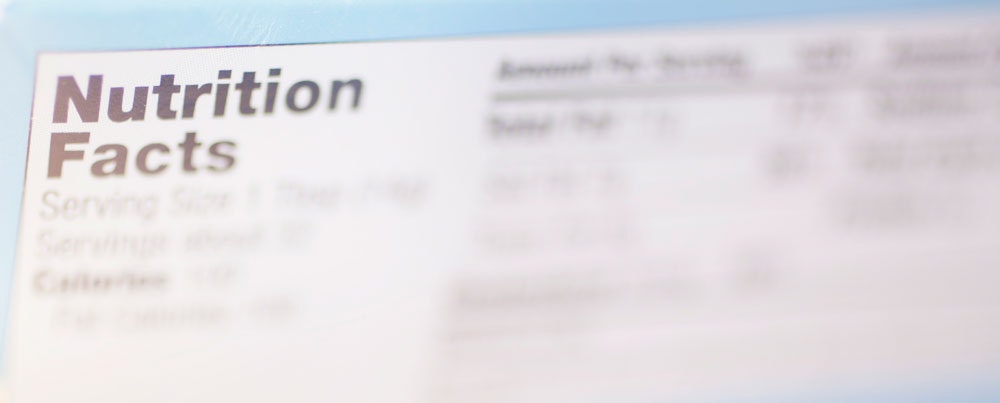

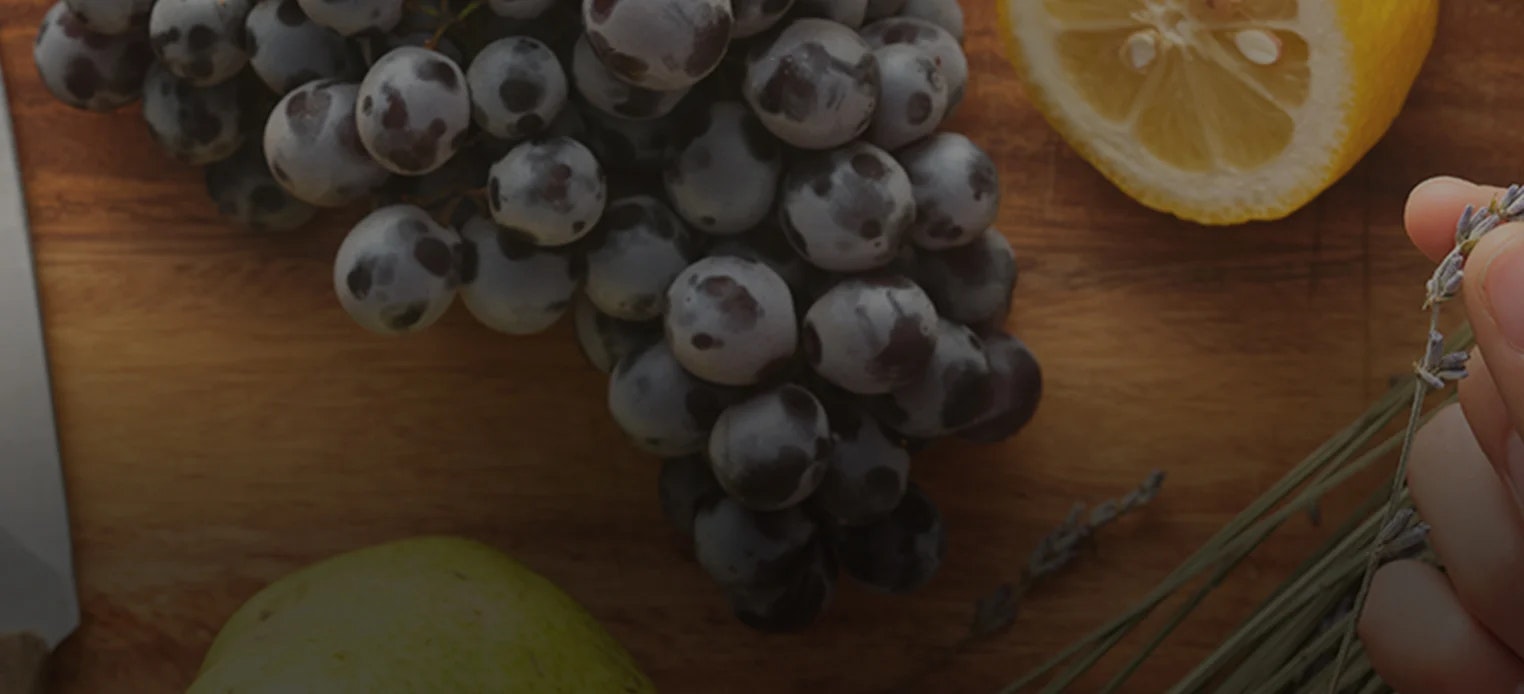
Comment